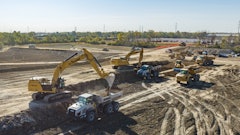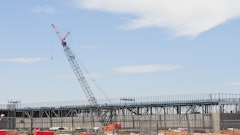
Construction employers added 5,000 jobs in September while the industry's unemployment rate hit 11.9 percent, according to an analysis of new federal data released today by the Associated General Contractors of America. Association officials cautioned that construction employment has been relatively flat for more than a year as growing demand for residential and some commercial projects has been offset by declining public sector construction activity.
"Despite the slight uptick in construction employment for the past month, the industry is a bit smaller than it was one year ago," said Stephen E. Sandherr, the association's chief executive officer. "It appears that for every rebounding market segment, there is another one that is shrinking."
(News: Fiscal Cliff Dampens Demand for Construction Projects)
Construction firms employed 5.523 million people in September, up from 5.518 in August, Sandherr noted. Despite the monthly gains, however, the sector's overall employment in September was 5,000 lower than one year earlier. The construction industry employs 2.2 million fewer people than it did six years ago when the sector's employment peaked at 7.7 million workers.
Both residential and nonresidential construction added jobs in September, even as residential construction outpaced nonresidential for the year. Residential building contractors added 1,100 jobs in September and have gained 3,200 for the year. Meanwhile, residential specialty trade contractors added 2,300 jobs in September and 19,700 for the year.
Nonresidential building contractors added 1,100 jobs in September but have lost 12,400 during the past 12 months. Nonresidential specialty trade contractors added 1,500 jobs for the month but lost 30,000 for the year. The heavy and civil engineering construction sector lost 200 jobs in September but has added 14,600 since September 2011.
Sandherr cautioned that over two million former construction workers have left the industry, either to retire or for other jobs in faster-growing sectors. He said that as a result, the industry will have a hard time finding skilled workers once construction demand rebounds. He added that federal tax and spending uncertainties were making it hard for firms to encourage people to consider careers in construction.
"Becoming a skilled construction worker requires months of training and practice," Sandherr noted. "It is hard to get new workers to start months of training for jobs that may not be there next year if firms are paying more in taxes and earning less on public projects."




























